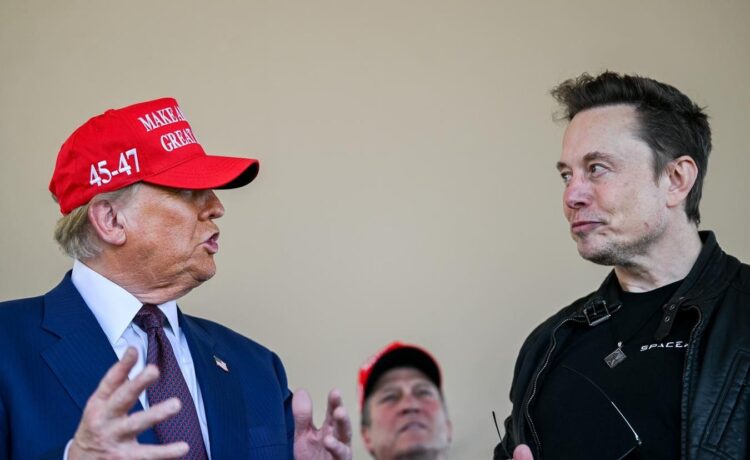Elon Musk speaks with Donald Trump at a viewing of the launch of the sixth test flight of the SpaceX Starship rocket on November 19, 2024 in Brownsville, Texas.
Brandon Bell/Getty Images
Oh, to be a fly on the wall at the headquarters of Fitch Ratings, Moody’s and S&P Global as Donald Trump and Elon Musk wreak financial havoc in Washington.
In conversations here in Asia with policymakers, business executives and investor types, the issue of America’s credit rating is coming up with alarming frequency. To many in this region, it’s remarkable that we haven’t heard more from credit-rating companies as U.S. President Trump and his tech billionaire entourage, led by Musk, upend Washington.
The stability, transparency and accountability about which U.S. officials spent decades lecturing Asian governments is disappearing in real time. Also, the Trump-Musk tag team strangling the U.S Agency for International Development is nearly as big a gift to China as the Trump 1.0 White House’s 2017 exit from the Trans-Pacific Partnership trade bloc.
What’s more, officials in capitals from Tokyo to Jakarta are struggling to comprehend why Musk and his shadowy band of tech bros were granted access to the U.S. federal payments system. And by Treasury Secretary Scott Bessent, who many hoped would be a moderating force in MAGA world.
Yet for Washington’s top bankers here in Asia, the disorientation of the 19 days since Trump returned to power, it’s all a bit personal. Many of the biggest holders of U.S. Treasury securities are Asian central banks. Japan is the most exposed to Trump 2.0’s antics with $1.1 trillion of Treasuries. China is No. 2 with about $770 billion.
Beyond the wild barrage of executive orders and whiplash surrounding the status of the trade war, Asian central bankers are anxious about the policies on which Trump ran. These include more giant tax cuts at a moment when the U.S. national debt is heading toward $37 trillion, the odd theory that tariff-driven revenues can replace taxation, Trump’s temptation to devalue the dollar and his oft-stated desire to wrestle decision-making power away from the Federal Reserve.
This last risk strikes many Asian officials as the most immediate. Asia scrapped most of its dollar pegs during its 1997-1998 financial crisis. But 27 years on, this region is far too reliant on the dollar, U.S. government bonds and the whims of a chaotic White House for comfort.
Late last month, Fed Chairman Jerome Powell effectively defied Trump’s craving for lower rates. Trump told CEOs in Davos a week earlier that he’d “demand” that interest rates go down. Of course, the tariffs Trump threatens and his mass deportation plans at home are sure to boost inflation, increasing the odds that the Fed’s next move will be to tighten, not ease.
If this clash unfolds as feared — including Trump’s hints at watering down the Fed’s mandate — nearly $3 trillion of Asian savings would be in harm’s way. Over time, Team Trump also mulled steps to devalue the dollar or even to default on U.S. debt.
The fallout from either gambit could make the 2008 Lehman Brothers crisis seem tame by comparison. The surge in U.S. yields would devastate asset markets everywhere. It also would have Asian central banks looking for a new safe haven with the scale and liquidity of the dollar. Finding one is easier said than done.
The best-case scenario concerning Trump’s plans for the dollar might be trying to pull off another “Plaza Accord.” The original one in 1985 saw Japan agree to a significantly stronger yen. Who thinks Chinese leader Xi Jinping would do the same?
With China struggling with deflation, Xi’s men are carefully studying how the yen’s surge 40 years ago devastated Japan’s economy, one struggling with the side effects even now. Tokyo still hasn’t been able to get short-term rates above 0.5%, where they sit today.
Japan remains uniquely addicted to a weak currency for a Group of Seven nation. This case study explains some of why Xi is reluctant to devalue the yuan. If Trump took a sharpie to the dollar, though, all bets would be off. History’s greatest race to the bottom could cause unthinkable damage.
Yet what’s happened these last 19 days already has Asia in a whirl. What about the folks at Moody’s, Fitch and S&P? The head-spinning rate at which U.S. governance standards are deteriorating would seem impossible for the keepers of financial goalposts to ignore.
As Trump plays fast and loose with America’s economic reputation, he’s taking Washington’s Asian bankers for granted. That could be a grave mistake if officials in Tokyo, Beijing or elsewhere called America’s loans.













